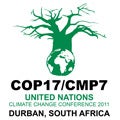 Over 500 farmers representatives, scientists and development practitioners were out in force today at the third Agriculture and Rural Development Day (ARDD) in Durban. They are determined to put agriculture on the COP 17 agenda.
Over 500 farmers representatives, scientists and development practitioners were out in force today at the third Agriculture and Rural Development Day (ARDD) in Durban. They are determined to put agriculture on the COP 17 agenda.
Their arguments are clear: Any serious effort to reduce green house gasses must include agriculture. And COP 17 is the chance for Africa to shape the agenda and establish an agriculture work program that is informed by science and covers adaptation and mitigation. And even for some `No agriculture, No deal'.
And today these voices are being heard.
Three years ago there was very little discussion around agriculture and climate change…this year agriculture events are everywhere around the COP.
Climate-smart agriculture – that’s agriculture that combines proven conservation agriculture techniques with the latest technologies like drought and flood tolerant crops, better weather forecasting and risk insurance for farmers – is gaining momentum.
People are paying attention because climate-smart agriculture delivers a triple win – increased productivity, increased adaptation and mitigation benefits.
Agriculture is being reimagined.
Africa stands to benefit most from climate-smart agriculture because of the vulnerability of rural people to climate change and the dependence of so much of the population on agriculture. And for Africa, adaptation is key.
ARDD was an inspiring showcase of climate-smart agriculture in action demonstrating just how much we know already. The emphasis across the learning events was on building resilience of smallholders touching on everything from strengthening access to markets, access to carbon finance to innovative water harvesting techniques.
In some cases, new technologies and new knowledge are not reaching the people who need it the most. We need to make sure that the latest technologies get off researchers’ shelves and into the hands of smallholder farmers.
But there is also recognition that we need to learn more. For example, more about how best to capture and store carbon through different farming techniques, and more about soil carbon capture; how to achieve sustainable intensification or how to produce more with more efficient use of inputs; how to ensure that policies support an integrated approach to planning for food security, poverty reduction and climate change.
There is always more that needs to be done, and more to learn–but the knowledge, enthusiasm and track record of the farmers and experts–indicate they have no intention of giving up before they win their fight.
For the sake of the billion people who suffer hunger every day – let’s hope global leaders hear these voices. We can’t afford to fail.
Follow Rachel Kyte's tweets (@RKyte365) at her liveblog from the COP17 conference in Durban



Join the Conversation